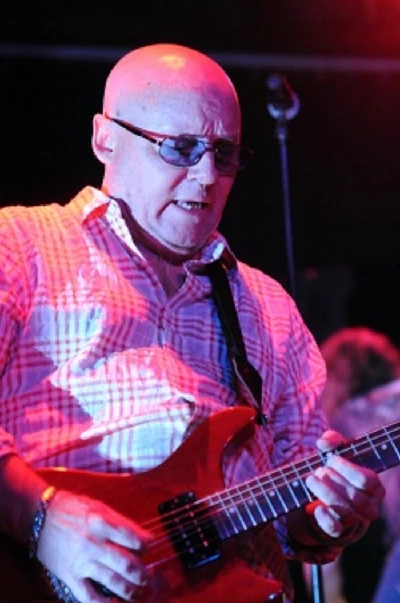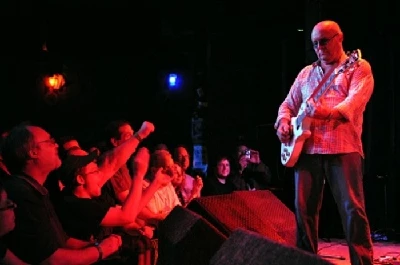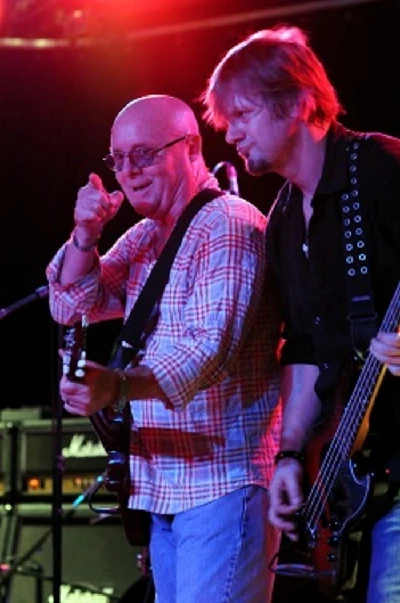published: 13 /
3 /
2012

Lisa Torem pays personal tribute to Montrose and Gamma guitarist Ronnie Montrose who died on March 3rd
Article
On Sunday October 9th 2011, I met my friend and colleague, photographer Jim Summaria, at Reggie’s, a thriving watering hole, located on an industrial strip in Chicago. We were both psyched because we were going to meet up with Ronnie Montrose, a talented rock guitarist, whose career started in the 70s. Some days ago, Jim and I were shocked when we found out that Ronnie had died of prostate cancer.
Montrose impressed Van Morrison with his shredding on 'Tupelo Honey'; toured with Edgar Winter (he played that incendiary solo on ‘Frankenstein’ and ‘Free Ride’); worked with then unknown singer, Sammy Hagar, in the group, Montrose, bringing those early crowds to their feet with ‘Rock Candy’ and ‘Bad Motor Scooter’; formed the more progressive band, Gamma, and went on to release striking, solo instrumental albums; these unforgettable forages into untapped emotion, like ‘Town Without Pity’ saw Montrose bare his soul.
I wasn’t sure how we would be received that night. After all, the interview would take place before show time. Ronnie and his wife, Leighsa, would be driving straight through from another city. They would be exhausted and might not really want to spend their last moments of free time with the press, and who could blame them?
Nevertheless, not knowing exactly what to expect, Jim and I ordered some snacks and waited for Ronnie to give the green light. Jim was prepped to take photos and I had my recorder cued up to start firing away questions. But when Ronnie and Leighsa, appeared, life slowed down a little. They graciously introduced themselves and thanked us for the opportunity to talk.
Ronnie was what you might call a working man’s artist. He made his fans feel completely at home. Maybe he didn’t stand on ceremony because he was a man who worked with his hands. That vocation is what led him to get connected with Morrison. He was an ambitious guitarist who did side jobs.
When he got onstage, fans screamed his name with a sense of confidence, not urgency. He and his fans seemed to have some kind of pact, some kind of understanding. When Ronnie walked on stage, the fans would get their money’s worth. He would play the songs they loved. He would be the tireless rock star they expected, and he was never too busy to ask the audience about their own lives.
When the time came for the interview, we piled into a small anteroom. It was less an interview than a meeting of minds, and an enjoyable chat about what makes great music. Ronnie’s eyes lit up when he talked about performing. We knew he had struggled previously with illness, but he had come through. Leighsa, a warm and gentle woman, had also been a fan. It was clear that they shared a strong connection.
Our conversation never felt rushed, but we all knew he had a show to think about. That night the concert went on for more than two hours. A few obscure tunes were sprinkled about, but the hits were played, too. Spirits were lifted by a sense of belonging that caused people to lean over and smile and touch Ronnie’s hand or equipment. Ronnie looked as comfortable on stage as off. He made people happy with his music. His fans became, quite naturally, part of his inner world, not just once, but again and again.
I learned something very special about rock stars that evening. A good one plays his heart out and demands applause, but a great rocker plays his heart out and appreciates applause. Thank you, Ronnie, for spelling out the difference.
The photographs that accompany this article were taken by Jim Summaria www.jimsummariaphoto.com
Picture Gallery:-

